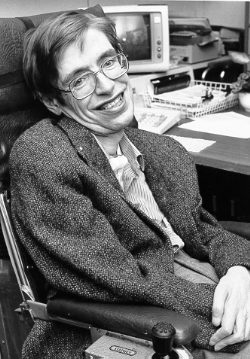I watched part of a show about Stephen Hawking, and he talked about how he came up with a theory that says that information is preserved in universes without black holes. I don't get this at all. Why can't information be destroyed?

Stephen Hawking
Image from StarChild learning center, NASA
The way one of the main ideas of Relativity is often stated is that "nothing can go faster than the speed of light". That isn't exactly true. One of the strange bits of Quantum Mechanics is that 2 qubits (quantum particles like electrons or photons) can become "entangled" - each will be the mirror image of the other with exactly the opposite spin, polarization and momentum. Now, until you measure one of them, you can't know any of this information (got that, "information"?). Here's the trick. There are ways of flipping all the values (spin, polarization, etc.) of a qubit (electron, photon, etc.) without actually measuring what they were before you flipped it. Now you'd think that, since you have 2 mirror image particle traveling away from each other at the speed of light (if we are using a photon), that, if you "flipped" one of them, you'd end up with 2 identical particles, yes? Nope! They are STILL mirror image particles! In effect, if you "flip" one, they both flip - even if they are traveling away from each other at the speed of light. How can this information travel from one particle to the other at at least twice the speed of light? Remember that you can't tell any of the "information" about our particle until you measure it and there is always a 50/50% chance of which spin/polarization/etc. particle you get - there is no way of "choosing" the one you will get. Since this is always exactly random, there is no USEFUL information traveling to the other particle. Got that?
So, you can restate Relativity to say "no USEFUL information can travel faster than the speed of light"
Quantum Mechanics states that particles and their anti-particle (like electrons and positrons) are constantly being created and instantly destroyed in "empty" space. These are "entangled" particles as discussed above. This strange idea has a surprising effect at a black hole. Right at the event horizon, if a particle/anti-particle pair comes into existence, one of them can get tugged into the black hole never to be observed or measured in this universe. We can measure the particle that escaped but how can this information be passed to the entangled particle that fell into the black hole? That information is "destroyed". If you live in a universe without black holes, information isn't destroyed. Got it?
He also asked: Also, in billions of years, would all the matter in our universe be swallowed up by black holes, so there will just be a vacuum?
Black Holes aren't really different from any other object when it comes to interaction of gravity. You can orbit a black hole as easily as you can orbit a star. If not disturbed by outside objects, you could orbit a star "forever" (whatever that means). It is actually hard to make two big object (stars, planets, etc.) crash into each other.
There are other questions that come in to play with this question: Does the universe expand forever? Can entropy be reversed by anything other than life? Sorry, but I don't have the answers to these questions (yet).